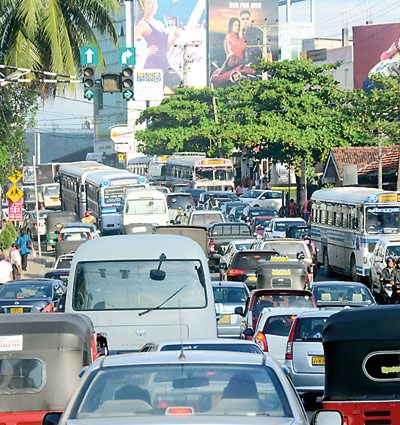News
Lane discipline at crossroads: Road users flash green and red lights
Police will not withdraw the lane discipline rule despite protests from private bus operators and motorists’ complaints that it has only made a bad situation worse, Police Traffic Chief Amarasiri Senaratne said.

Traffic buildup was more after the introduction of lane discipline
It is true that the implementation of the regulations had slowed down traffic flow, but motorists were learning to be disciplined while most private bus and three-wheel drivers now avoid zigzagging from lane to lane, he said.
Many motorists the Sunday Times spoke to are not sure whether the strict implementation of the rule since last week would achieve the desired result – easing the traffic congestion in the city.
They said it was too early to comment about its success or failure, though they were adhering to the rule.
A Sunday Times team on a city tour noticed that since the enforcement of the lane discipline rule, the traffic buildup at some junctions was more than usual while it is also more orderly than before in some areas.
“Since the police have decided to implement the lane system strictly, many motorists are not taking any chances. So I believe the system may bring in the desired results in a week or so,” Nirmala Kathuriratne, a motorist from Borella, said. But he said more awareness campaigns should be carried out to warn outstations drivers who come to Colombo.
Another motorist Wasantha Abeyratne from Kirulapone said he welcomed the move as it had instilled some discipline into private bus drivers who were a law unto themselves.
“They drive recklessly and do not care about other road users. A car driver is more careful with his or her vehicle and therefore would often give way to a private bus even though he or she has the right of way.
The private bus drivers take undue advantage of the situation,” Mr. Abeyratne said.
However, some bus travellers are not in favour of the lane discipline law because it now takes longer for them to reach their destinations. “It is true the move has improved road safety, but we get late to get to office.
The police should find other ways of easing the traffic congestion,” commuter Nalindrini Vitharana said adding that authorities should look into illegal parking and other traffic law violations as ways of ensuring smooth traffic flow.
Police Traffic Chief Amarasiri Senaratne said that they would not give up the steps they had taken to ease the traffic congestion in the city due to complaints private bus owners associations had lodged with the Human Rights Commission.
Explaining that the rule had been implemented strictly since last week to ensure road safety and reduce accidents, DIG Senaratne said the private bus drivers were the biggest violators of the lane discipline rule and it came as no surprise when they complained to HRC against the lane discipline rule, according to which they had to stick to one lane especially set aside for buses.
Pointing out that traffic snarls were created when motorists try to overtake each other, disregarding the lane discipline rule, the Traffic Chief said police had been told to implement the traffic rules strictly.
He said that more than 15,000 motorists had been taken to courts and fined for violating the lane discipline rule – an offence that does not come under the spot fine category.
National Police Commission member Anton Jeyanathan, a former Traffic DIG, said he believed that the lane discipline rule would discipline bus drivers and three-wheel drivers.
“Bus drivers pick people even from the middle of the road and race agaisnt each other. When they cut towards other vehicles, they do so haphazardly, and they often drive zigzag on the road,” he said.
Mr. Jeyanathan said the authorities have decided to implement the law to ease the traffic problem and, therefore, motorists must fall in line.
Lanka Private Bus Owners’ Association President Gemunu Wijeratne said they went to the HRC demanding that they be given a separate and exclusive bus lane and it was not a tit-for-tat move.
However, he said his association supported any move to crack down on reckless driving.
He said commuters were not happy about the new move and the lane discipline rule was only adding to the traffic snarl and travel time.
Sri Lanka Transport Board Deputy Director D.P Raja Gunathilake said state bus drivers would obey the rule, though they were badly affected by the new move. It has disrupted the roster and led to a decrease in the number of passengers because of the delays, he said.
He said that to ease the traffic congestion, the authorities should look into other options such as streamlining parking.
Commenting on the private bus operators’ demand for an exclusive bus lane, Mr. Gunathilake said that such a system operated in some foreign countries and to implement it here Sri Lanka’s city roads should be further broadened to create more lanes.
Dr S. Kodagaoda, Chairman for the Council for Road Safety, said they supported the implementation of the lane discipline rule but it should be monitored properly. He also said they saw some justification in the call for a separate lane for buses and they would discuss it further.
He said some roads have enough space to set aside a separate lane for buses and where possible such lanes should be colour marked to indicate that they were only for buses.

